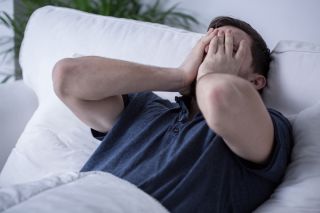Sleep
The Mystery of Why You Can Wake Up with a Shock
And what you can do to hopefully prevent it.
Posted March 31, 2015 Reviewed by Lybi Ma

You have just drifted off to sleep when suddenly you feel like you are falling and are jerked awake.
What happened?
You just experienced what is known as a “sleep start” or “hypnic jerk." Technically defined as “sudden brief, simultaneous contractions of the body or one or more body segments occurring at sleep onset” (AASM, 2014), these starts seem to occur either without warning or in response to a stimulus, such as a noise in the bedroom. Typically, people feel as if they're falling, or may hear a loud banging or snapping noise. Sometimes visual effects are reported with aspects of dreaming or perhaps flashing lights. These jerking movements can also occur in an annoying series, making it difficult to fall asleep.
Research explains who most often experiences these incidents and when they happen, but the cause is still undetermined.
Approximately 70% of people have experienced sleep starts. Males and females of all ages report them occurring with equal frequency. Several factors can impact their occurrence, though, including excessive caffeine consumption, intense stress, and too little sleep. Occasionally they can occur so frequently that they contribute to the development of insomnia. If very strong, the starts or movements can cause fear of falling asleep. The worry and anxiety associated with them can result in sleep deprivation.
Hypnic jerks may just be a normal part of falling asleep but are either not noted or quickly forgotten. There are no known pathological causes. Indeed, the cause is unknown but may be the result of output from the brainstem reticular formation that becomes activated during the transition between wakefulness and sleep. Sleep starts are very similar to the startle experience we have during the day when, for example, we hear a loud, sudden noise behind us. It may be that, as in the startle response, sensory processing is primary, with secondary motor actions caused by the reticular formation in the brainstem.
Polysomnography has confirmed that hypnic jerks occur at the start of sleep episodes, during the transition to sleep when people are drowsy, or in Stage One sleep. If the jerking movements are very strong, they can be associated with significant arousal, including rapid heartbeat and irregular breathing. It's not uncommon for people to be awakened from light sleep as a result of a sleep start.
Typically sleep starts are benign and require only reassurance that they are not harmful. This is the case for most people. If however, someone is experiencing frequent hypnic jerks that result in insomnia, it is important to consult a physician to rule out sleep-related movement disorders or other pathological causes.
It is possible to develop a treatment plan that would most likely include approaches such as reduced caffeine intake and better stress management.
References
American Academy of Sleep Medicine. (2014). International classification of sleep disorders, 3rd ed. Darien, IL: American Academy of Sleep Medicine.


